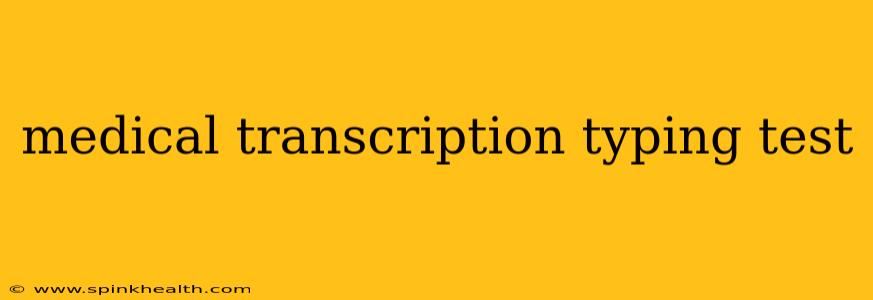Ace the Medical Transcription Typing Test: A Story of Skill and Accuracy
The clock ticked, each second a hammer blow against the quiet intensity of the room. Sweat beaded on Sarah’s forehead, her fingers flying across the keyboard in a blur. This wasn’t just any typing test; this was the medical transcription typing test, the gatekeeper to her dream career. For months, she'd poured over medical dictionaries, practiced her typing speed, and honed her ability to decipher the sometimes cryptic shorthand of doctors' notes. Success meant a fulfilling career, a chance to make a real difference in healthcare. Failure? Well, that was a thought she tried to avoid.
This wasn't just about speed; accuracy was paramount. A single misplaced comma, a misspelled word, could have life-altering consequences. This was about precision, responsibility, and the trust placed in her ability to accurately translate the vital information contained within those audio recordings. The weight of that responsibility settled heavily on her shoulders, fueling her determination.
This story is about mastering the medical transcription typing test, a challenge that blends technical skill with meticulous attention to detail. Let's delve into the key aspects that ensure success.
What is a Medical Transcription Typing Test, and Why Is it Important?
A medical transcription typing test evaluates a candidate's ability to accurately and efficiently transcribe dictated medical reports, notes, and other documents. It assesses typing speed, accuracy, medical terminology knowledge, and comprehension skills. It’s crucial because medical transcriptionists play a critical role in the healthcare system, ensuring that patient records are accurate, complete, and readily accessible for all involved in their care. An error in transcription could lead to misdiagnosis, incorrect treatment, or other serious medical issues.
What are the typical requirements for a medical transcription typing test?
This varies depending on the employer, but generally, medical transcription typing tests assess:
- Typing Speed: Most employers look for a minimum typing speed of at least 60-70 words per minute (WPM). However, higher speeds are always preferred.
- Accuracy: Accuracy is more critical than speed. Even the fastest typist will fail if their accuracy is below a certain threshold (typically 98% or higher).
- Medical Terminology: The test will assess your knowledge of medical terms, abbreviations, and acronyms.
- Comprehension: You'll need to understand the dictated audio and accurately convert it into text, capturing the meaning and context correctly.
How can I prepare for a medical transcription typing test?
Preparation is key. Here's a strategy to boost your chances of success:
- Practice Typing: Use online typing tutors and practice tests to improve your speed and accuracy. Focus on maintaining accuracy, even at a slower pace initially.
- Master Medical Terminology: Use medical dictionaries and online resources to learn and memorize common medical terms, abbreviations, and acronyms. Flashcards can be incredibly helpful.
- Improve Listening Skills: Practice listening to audio recordings of medical dictations and transcribing them. Listen actively, paying close attention to every detail.
- Take Practice Tests: Simulate the real test environment by taking practice tests under timed conditions. This will help reduce test anxiety and build confidence.
- Learn Medical Shorthand: Familiarity with medical shorthand systems will significantly improve your transcription speed and efficiency.
What are some common mistakes to avoid during the test?
Several pitfalls can derail even the most prepared candidate:
- Rushing: Maintaining accuracy is more important than speed. Slow down and focus on precision to minimize errors.
- Ignoring Punctuation: Proper punctuation is essential for clarity and readability in medical reports.
- Misinterpreting Medical Terms: If unsure of a term, look it up to ensure accuracy. Guessing can be costly.
- Poor Time Management: Plan your time effectively during the test to ensure you complete it within the allotted time.
Sarah, breathing deeply, took one last look at the screen. The audio began. Weeks of preparation, of sweat and dedication, culminated in this moment. Her fingers moved, translating the doctor's words into clear, accurate text. The clock ticked on, but now, with each keystroke, she felt a sense of confidence, of control. This wasn’t just a test; it was the story of her ambition, realized. And as she finished, a sense of quiet satisfaction filled the room. She'd aced it.

